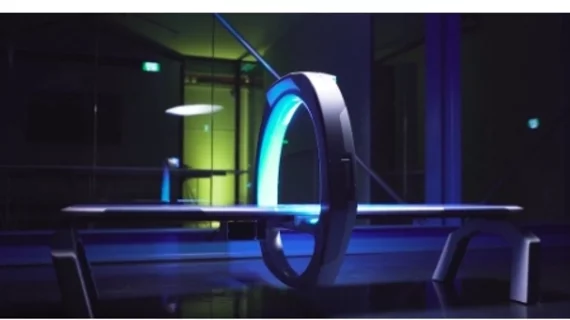Nanox reports $11M quarterly loss, GE Healthcare’s $130M new partnership, plus more vendor news
Controversial imaging startup Nanox on Monday reported an $11 million net loss in the third quarter of this year during its first earnings call since a successful IPO.
All told, that initial public offering raised some $190 million over the summer for the Israel-based company. But it was overshadowed by accusations from one investor group, alleging the company is a stock promotion driven by inflated claims about Nanox’s novel imaging technology. Entrepreneur and CEO Ran Poliakine, meanwhile called the charges “baseless,” planning to “crush” them with a demonstration of the company’s imaging system, the Nanox.ARC, at RSNA.
He touted that upcoming event in a Nov. 9 announcement.
“We look forward to demonstrating our digital x-Ray technology in a range of 2D and 3D medical imaging procedures at this year’s virtual Radiology Society of North America 2020 meeting later this month, and intend to make these materials available to our investors and global stakeholders so they can join and witness our technology,” Poliakine said.
Nanox’s $11.1 million net loss in Q3 came in contrast to a $1.9 million loss during the same three months in 2019. Officials noted that the tally came as the firm increased spending on research and development, sales and marketing, and general and administrative expenses. The latter leapt from $1 million up to $6.3 million in 2020 for expanding its management team and bolstering the “overall organization infrastructure.”
BrainTale raises $1.2M
French imaging technology firm BrainTale recently raised nearly $1.2 million in new seed funding, officials said Monday.
The Paris-based company provides a software-as-a-service solution that helps radiologists quantify brain lesions from MR images. It’s already scored a CE mark in Europe and was recently recognized by the French Society of Radiology, according to an announcement.
“This first financing milestone is a leading step towards our journey to enable adapted care for patients with neurological diseases,” CEO Julie Rachline said in a statement.
GE’s $130M partnership
Imaging manufacturer GE Healthcare on Monday announced a new strategic partnership with GenesisCare, the largest provider of cancer and cardiac treatment services in Australia.
Under the $130 million (USD), five-year deal, GE will supply and service the latest CT, MRI, PET/CT, SPECT, mammography and ultrasound technology to its customer’s 440-plus centers. Along with Australia, GenesisCare also operates in the U.S., U.K. and Spain.
Company officials said their goal is to bolster access for both doctors and patients amid the COVID crisis.
"Cancer and heart disease haven't stopped during this pandemic, and high-quality imaging and diagnosis will be in greater demand than ever as many people begin to feel more comfortable accessing screening services," CEO Dan Collins said in a Nov. 9 statement.
Rapid fire
A few more radiology-related vendor news items of note, in rapid fashion:
- Swedish PACS vendor Sectra recently deployed its medical imaging solutions at the Leeds Teaching Hospitals in the U.K.
- New Jersey-based Hackensack Meridian Health touted the addition of a new SPECT/CT camera from Siemens in its nuclear medicine division.
- In more news out of the Germany-based giant, Siemens also just announced a 10-year partnership with University of Iowa Health Care.
- Novarad this month launched a new COVID-19 artificial intelligence software, available to download for free.
- And finally, AI Metrics last week announced that it had raised $1.7 million in new funding to fuel the roll out of its imaging analysis and reporting systems in radiology and oncology.

